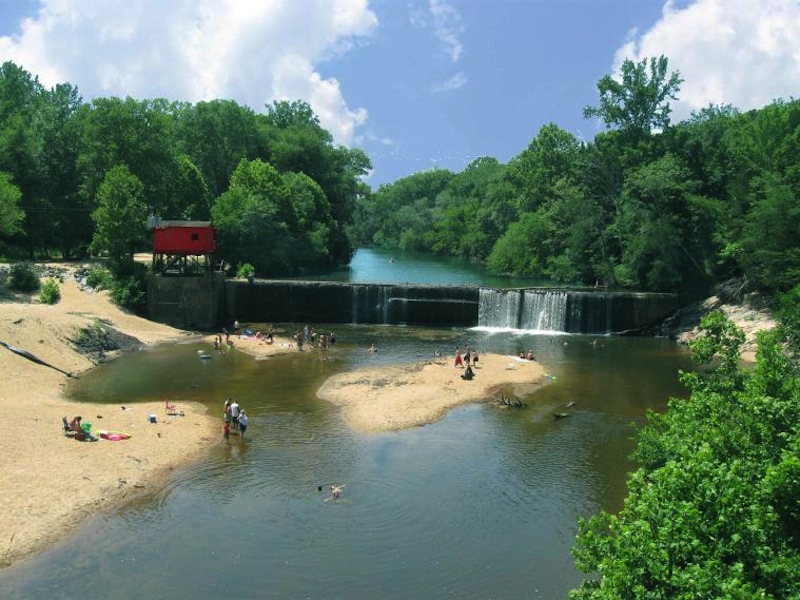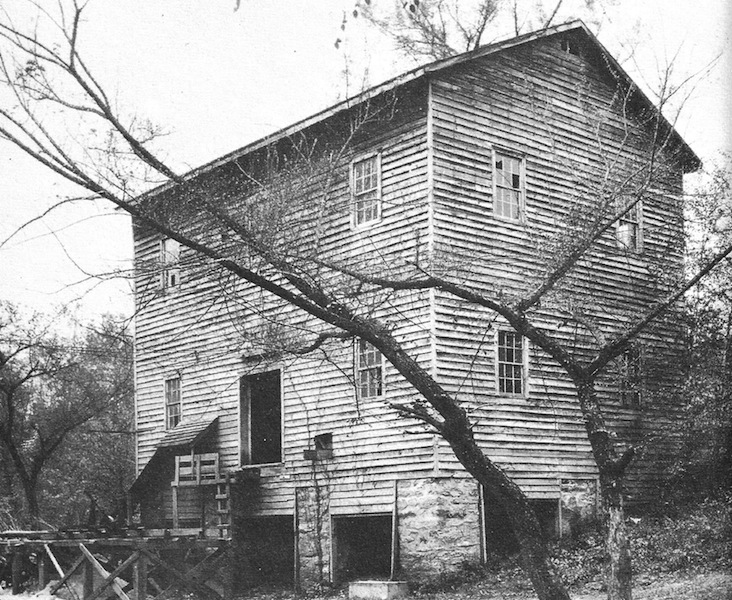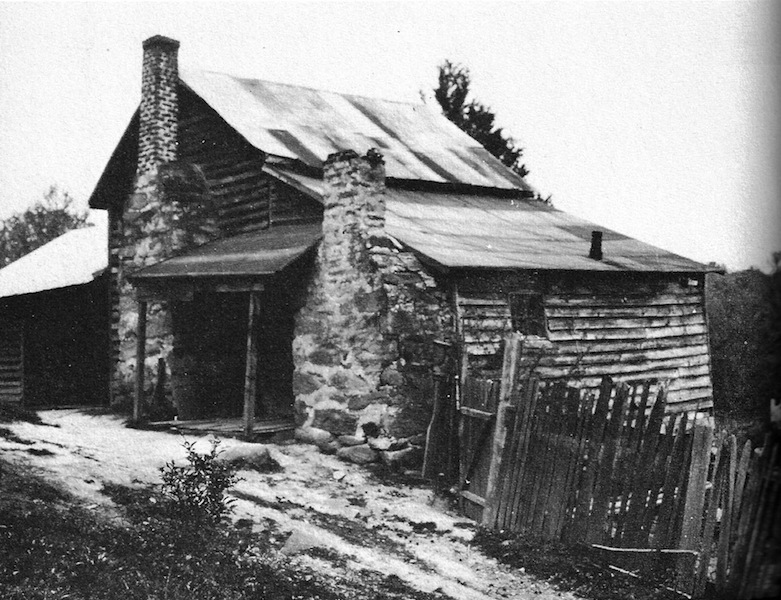Max Bagley Crowder Memorial Park at Whittle's Mill
Historic mill, picnic area, and canoe/kayak launch
1793 Bridge Road, South Hill, VA 23970
(434) 447-3191 (South Hill Town Hall)
(434) 447-4547 (South Hill Visitor Center)
Hours:
Dawn to dusk; "primitive" tent camping is available after dusk to those who complete a camping reservation form at the South Hill Town Hall, located at 211 S Mecklenburg Ave., South Hill, VA. Only those with camping reservations are allowed in the park after dusk.
Fees: No fees for most activities; there is a $5.00 per night fee for camping.
Whittle's Mill is the site of a colonial era grist mill on the Meherrin River along the border of Mecklenburg and Lunenburg Counties. The park is among the loveliest small river sites in Southern Virginia, and the history of its namesake family is deeply entwined with the story of America. The scenic old millpond has been Southside Virginia's unofficial park for generations. The Town of South Hill has now made it official as the Max Bagley Crowder Memorial Park, honoring a distinguished Southside Virginia historian.
(434) 447-3191 (South Hill Town Hall)
(434) 447-4547 (South Hill Visitor Center)
Hours:
Dawn to dusk; "primitive" tent camping is available after dusk to those who complete a camping reservation form at the South Hill Town Hall, located at 211 S Mecklenburg Ave., South Hill, VA. Only those with camping reservations are allowed in the park after dusk.
Fees: No fees for most activities; there is a $5.00 per night fee for camping.
There has been a mill on the Meherrin River since 1756, when enterprising colonist John Brooks built a log and earthen dam across the river to power a grist- and sawmill. The mill was later owned by Revolutionary War Captain Thomas Bedford, remembered for equipping an infantry company with his own funds that he commanded through notable battles. After the war, Bedford built a stone dam and operated a mill, mercantile store, granary, distillery and a popular ale house. The Revolutionary War veterans of Southside Virginia were, it would seem, high in spirits.
Colonel William Davies, a hero of the American Revolution and close friend and aide-de-camp (chief of staff) to both George Washington and the Marquis de Lafayette, bought the mill in 1796 and brought his family to Mecklenburg in 1800. Davies' daughter married Fortescue Whittle, a shipping magnate and refugee of the Irish Rebellion. The mill and farm passed in 1809 to the Whittle family for nearly a century. Fortescue and Mary Ann Whittle operated a large farm, tavern, granary, distillery, mercantile store and post office near the grist mill, and they raised a distinguished family at their Millbank Plantation.
The Whittle family was swept into the tragedy of the Civil War, and they have been called "the real Gone with the Wind family of America." Among their 14 children were Commodore William Conway Whittle, Senator James Murray Whittle, Dr. Conway Davies Whittle, Dr. John Samuel Whittle, Stephen Decatur Whittle, Colonel Lewis Neale Whittle and Bishop Francis M. Whittle. The youngest son, Colonel Powhatan Bolling Whittle, commanded the 38th Virginia regiment that made the deepest advance into the Federal line during Pickett's Charge at Gettysburg -- the "High Water Mark of the Confederacy." Commodore Whittle's son, William C. Whittle, Jr., was executive officer aboard the Confederate ship Shenandoah, which decimated the Union whaling fleet in Arctic waters and fired the last shots of the Civil War. The graves of Colonel William Davies, Fortescue Whittle and Colonel Powhatan Whittle rest nearby on private property in a family cemetery overlooking the river.
A succession of millers owned the property after the Whittle family. Most notably, A.W. Hankley raised the height of the rock dam and installed turbines and generators to run his mill from electricity -- an engineering marvel in Southside Virginia of the 1920s. Hankley's mill was destroyed by the Great Flood of 1940 along with all of the water mills in Southside Virginia. By the 1950s, supermarkets and store-bought bread had taken their toll, and the old gristmills across America faded into history. The Town of South Hill bought the property in 1963 and pumped its water supply from the site for many years. In 2010, South Hill engineer Steve Jones refurbished Hankley's original 1920 turbines and began generating electrical power at Whittle's Mill. It now generates about 20,000 kilowatt hours per month, fed directly into the Dominion Virginia Power grid. Two hundred years after Fortescue Whittle built his dam, clean energy from Whittle's Mill powers some Southside Virginia homes and businesses.
The Max Bagley Crowder Memorial Park encompasses banks of the Meherrin River. Any nice day will find families and friends congregating on the large sandbars and rock outcrops -- swimming, canoeing, fishing, hiking, camping, picnicking and lollygagging by the old millpond as they have for generations. The park is open for picnicking and tent camping year-round. There are no restroom facilities or hookups for RV camping.
Whittle's Mill is an access point to the Meherrin River Trail, a popular canoe and kayak trail that meanders through the forests and rolling hills of the Virginia Piedmont. The Meherrin is a designated Virginia Scenic River. Its dark waters remain unpolluted, and the river valley is secluded from development. It's not unusual to spend the entire day floating the Meherrin without seeing another person or hearing a sound other than the river, the wind and the abundant wildlife of the Meherrin Forest. The Town of South Hill maintains a canoe and kayak ramp just upstream of the millpond dam.
The park honors the memory of historian Max Bagley Crowder of South Hill who served for many years as Curator of the Virginia Farm Life Museum. His research, writing and public speaking greatly heightened interest in the Meherrin River, the legacy of the Whittle family and the secrets of the old mill. His was a leading voice in obtaining Virginia Scenic River designation for the Meherrin River.
Contributor: Dr. Catherine Townsend
Websites:
http://www.whittlesmill.org/
http://www.virginia.org/Listings/HistoricSites/MaxBCrowderParkatWhittlesMill/
Sources:
Full Sources for Historic Sites [pdf]
http://www.whittlesmill.org/
http://www.virginia.org/Listings/HistoricSites/MaxBCrowderParkatWhittlesMill/
Sources:
Full Sources for Historic Sites [pdf]
(c) Copyright 2014. All Rights Reserved. Designed by Jason Winter ||




